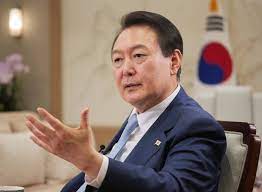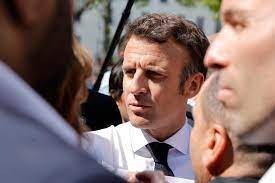At the NATO summit, Yoon of South Korea calls for a firm stance against the North’s nuclear aspirations
The president of South Korea believes that in order to prevent North Korea from pursuing nuclear weapons, it is imperative that the international community show strong commitment. This week, he will meet with NATO leaders to discuss how to deal with the North’s growing stockpile of weapons.
As part of a two-nation journey that also includes a visit in Poland, Yoon Suk Yeol will attend the annual NATO summit taking place this year in Vilnius, Lithuania on Tuesday and Wednesday.
He said, “Now is the moment to unequivocally show that the commitment of the international community to prevent North Korea from developing nuclear weapons is greater than North Korea’s ambition to do so.
Yoon will attend the summit for the second year in a row, highlighting his efforts to strengthen relations with the strongest military alliance in the world. A variety of security issues, such as North Korea’s nuclear programme and the geopolitical competition between the US and China, threaten South Korea. When he participated at the NATO meeting in Spain last year, he did so as the first South Korean leader to do so.
Yoon said in written comments to inquiries from The Associated Press before his departure that South Korea would emphasise at the NATO summit the value of international collaboration against “North Korea’s illegal acts.” Additionally, he said that a new NATO-South Korean pact, which institutionalises cooperation in 11 areas, including non-proliferation and cybersecurity, would come into force during the summit.
Since the beginning of last year, North Korea has publicly threatened to use nuclear weapons during prospective confrontations with South Korea and the United States, test-firing more than 100 missiles and increasing the urgency of its pursuit of viable nuclear weapons.
It’s still unclear if North Korea has operational nuclear missiles. However, a 2018 assessment by the South Korean government said that North Korea has up to 60 nuclear bombs. According to experts, North Korea can produce six to 18 new weapons annually.
Yoon, a conservative who entered office in 2022, acted in reaction to North Korea’s missile testing by bolstering his nation’s own missile capacity and increasing military exercises with the US. A new bilateral nuclear consultative group, whose inaugural meeting is scheduled for next week in Seoul, and the periodic docking of a US nuclear-armed submarine in South Korea are two initiatives Yoon and President Joe Biden announced in April to strengthen their countries’ deterrence capabilities.
The deployment of the American submarine, the North Korean Defence Ministry said on Monday, could spark “the worst crisis of nuclear conflict in practise.” Furthermore, it made threats to fire down US spy aircraft. The military of South Korea responded by saying that it is ready to rebuff any future provocations from North Korea.
Yoon’s discussion of North Korea with NATO leaders may provoke retaliation from the country, which has characterised growing alliance building between NATO and US allies in Asia as a process to establish a “Asian version of NATO” that would inflame tensions in the area.
North Korea claims that its campaign of nuclear testing was intended to send a message over the increased South Korean-US military exercises, which it perceives as invasion preparations. Yoon said he wants to choose the path of peace via force, but he is still open to talking to North Korea.
Yoon said, “Peace is never as secure and trustworthy as when it is supported by strong force and deterrent. “Stronger international sanctions against North Korea have the effect of preventing the advancement of its nuclear and missile capabilities.”
Yoon said that he would have “several opportunities” to talk with Biden in Vilnius about a variety of subjects, including the extension of trilateral security cooperation between Seoul, Washington, and Tokyo and the reaffirmation of US commitment to international security.
Yoon said that there would also be a bilateral meeting between him and Japanese Prime Minister Fumio Kishida. He said that he and Kishida will be able to talk about ways to strengthen bilateral ties as well as methods to promote worldwide collaboration and unity.
The mobilisation of forced Korean labourers by Japan during the colonial period has been a contentious point of contention, although relations between South Korea and Japan have greatly improved in recent months thanks to Yoon. The controversial Japanese proposal to transfer treated effluent from the wrecked Fukushima nuclear power plant, which was recently authorised by the UN Nuclear watchdog but is still opposed by many in neighbouring nations, is anticipated to come up during the Yoon-Kishida conference in Vilnius.
NATO leaders are anticipated to provide greater assistance to Ukraine’s military forces during the meeting in Vilnius since the nation is still under Russian occupation with no end in sight. They should also confirm that Ukraine would eventually join their alliance and establish a high-level platform for discussions.
In response to a request from Ukraine, Yoon said that South Korea has given humanitarian help and financial support to Ukraine in a number of ways and that shipments of demining tools, ambulances, and other supplies “are in the works.” He said that South Korea has previously offered assistance for the restoration of Ukraine’s damaged Kakhovka Dam.
In accordance with its long-standing policy of avoiding delivering weapons to nations actively involved in combat, South Korea, a rapidly expanding arms exporter, has refrained from directly supplying Ukraine with armaments. US intelligence papers that were leaked and published online earlier this year revealed that the National Security Council of South Korea “grappled” with the US in March over the US proposal to provide Ukraine artillery ammo.
In order to protect Ukraine’s independence, Yoon added, “The Korean government will continue to play its necessary role in tandem with the international community.” Additionally, we will develop the many assistance strategies required for the quick post-conflict restoration of peace in Ukraine and its rebuilding.
The fact that Yoon has been invited to the NATO summit alongside the presidents of Japan, Australia, and New Zealand is an indication of the alliance’s growing connections with countries in the Asia-Pacific. The four nations were also invited to the summit the previous year.
Yoon noted that events in the Indo-Pacific might have “immense ramifications” for nations in Europe “just as incidents in Europe can have a substantial and consequential impact on the Indo-Pacific region.” Particularly, the conflict in Ukraine has served as a reminder to everyone that a regional security issue might have global repercussions.







